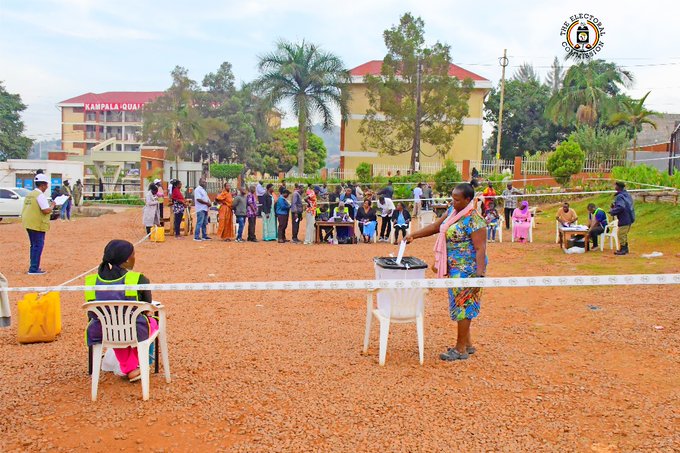
In line with its mandate under Article 52 (1) (h) & (2) of the Constitution of Uganda, the Uganda Human Rights Commission (UHRC) monitored the Kawempe North Constituency By-election held on 13th March 2025, to assess the human rights situation and the government’s compliance with national and international human rights standards.
Key Observations
- Voting Process and Security Presence
The Commission observed the voting process at 67 out of 197 polling stations in Bwaise I, Kawempe I, Kawempe II, Komamboga, Mpererwe, Kyebando, Kanyanya and Kazo Angola. While the elections began peacefully, with polling stations set up in accordance with the Electoral Commission’s guidelines, the environment only remained orderly in the early morning hours, allowing voters to cast their ballots without interference.
However, the enhanced military presence across polling stations raised concerns. While some voters felt reassured by the security, others particularly opposition party supporters reported feeling intimidated and fearful. When engaged by the UHRC, security officials explained the deployment as a preventive measure against potential violence and election-related clashes. The involvement of the military in civil elections should be restricted to instances where Uganda Police Force (UPF) may be over whelmed.
- Violence Against Journalists
The situation changed following altercations between security forces and journalists at Kazo-Angola polling station, where seven journalists from NBS, NTV, Daily Monitor, Spark TV and Salt Media were allegedly arrested, physically assaulted, and had their cameras confiscated or vandalized. Journalists reported being targeted for documenting election-related events. In addition to physical attacks, some faced verbal threats and intimidation. The affected journalists filed formal complaints at Kawempe Police Station, and investigations are ongoing.
The UHRC strongly condemns these acts, which violate press freedom, a fundamental pillar of democracy. Harassment and violence against journalists undermine independent reporting, compromises electoral transparency, and erodes public trust in the integrity of the electoral process.
- Intimidation of Electoral Officials
The UHRC also documented incidents of intimidation and harassment of Electoral Commission officials by security personnel. These actions violated the rights of election officials and threatened the credibility and integrity of the electoral process.
- Confrontations with Members of the Public
The UHRC further observed confrontations between security agents, public officials and voters at some polling stations. These incidents heightened tensions and may have contributed to voter suppression, ultimately leading to the low voter turnout of 14%. Such actions infringe on the right to participate in free and fair elections, as guaranteed under Article 59 of the Constitution of Uganda and Article 25 of the International Covenant on Civil and Political Rights (ICCPR).
Recommendations
In light of these incidents, the UHRC makes the following urgent and actionable recommendations:
- Protection of Media Freedom and Access to Information
The government should establish and enforce clear guidelines for the safety and security of media personnel, protection of rights of media personnel, and creation of mechanisms for journalists to report to authorities’ harassment or assault on them without fear of retaliation.
- Accountability for Human Rights Violations
The UHRC will work with relevant authorities to conduct prompt, independent, and impartial investigations into the assaults on journalists, harassment of electoral officials and confrontation with voters. Those responsible must be held accountable. Political actors must refrain from inciting violence or inflammatory rhetoric that may fuel confrontation between voters, security and themselves.
- Safe guarding the Independence of Electoral Officials
Security agencies must be sensitized to respect the independence and safety of electoral officials to enable them perform their constitutional duties without intimidation or interference.
- Strengthening Public Confidence in Electoral Processes
The Electoral Commission, in collaboration with other human rights bodies, media and Civil Society Organizations must intensify voter and civic education to strengthen public civic awareness and trust in electoral processes and ensure meaningful citizen participation.
Conclusion
The Uganda Human Rights Commission condemns the violence, intimidation, and harassment witnessed during the Kawempe North By-election. For an election to be free, fair and credible, it must be conducted in an environment that is secure, safe and peaceful, enabling citizens to exercise their right to vote. The Commission will continue to investigate the incidents and engage relevant institutions to ensure accountability and the protection of human rights in future electoral processes.
Hon. Lamex Omara Apitta
For: CHAIRPERSON
